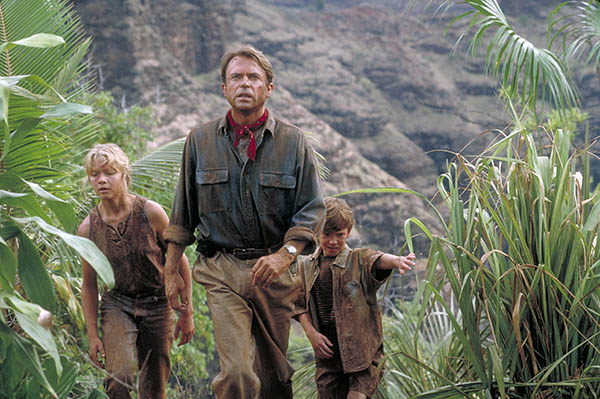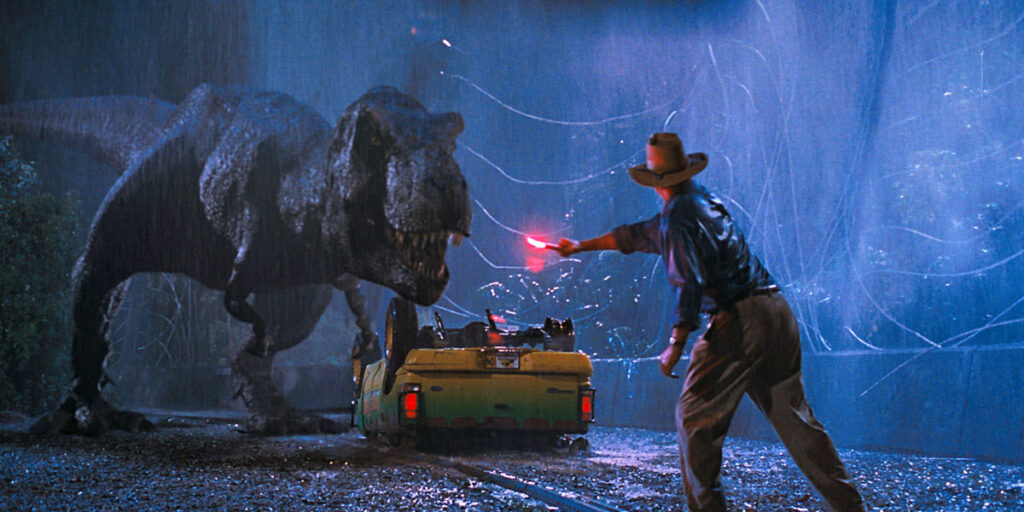Steven Spielberg’s Jurassic Park is not only one of the best summer blockbusters of all time, but also a thoughtful examination of our fixation with the past.
There are very few movies that have become as irrevocably entrenched in pop culture as firmly as Steven Spielberg’s instant classic Jurassic Park, which deserves every ounce of praise it’s received since its release almost thirty years ago. Although the film has spawned a series of sequels that all fail to recapture the magic that Speilberg injected into this timeless classic, the original film remains one of the most revolutionary pieces of blockbuster filmmaking there’s ever been. It represents the heights of Spielberg’s filmmaking talent, blending an insightful story with some unforgettable action set pieces and plenty of fleshed-out characters that bring this story to life on a surprisingly personal level.
For those that are somehow unfamiliar with the film, Jurassic Park tells the story of one wealthy businessman’s (Richard Attenborough) quest to bring dinosaurs back from extinction, opening a wildlife reserve off the coast of Central America where his team of scientists uses advanced technology to breed a new generation of prehistoric creatures. But when the dinosaurs begin to fight against their captivity, a select group of visitors to the island is forced to fight for their survival and find their escape. The film’s story is a fairly simple one, but Spielberg uses this to his advantage by building on his characters and their relationships rather than the intricacies of the plot – which raises the stakes tenfold and really helps get the audience involved in the uncertain fates of the film’s protagonists. It often sacrifices needless spectacle for a gradual build-up of tension, which few movies of this genre had dared to attempt before.
At the heart of Jurassic Park are Dr. Alan Grant (Sam Neill), Dr. Ellie Sattler (Laura Dern), and Dr. Ian Malcolm (Jeff Goldblum) – three personal friends of the park’s founder John Hammond, invited to the island to help him with his research and understanding of the creatures. The three leads all bring something completely different to their respective roles, complementing each other perfectly and making the whole ordeal feel much more personal and intimate. There had been dinosaur movies before Jurassic Park – but very few that had displayed a cast of characters quite as finely-tuned and well-developed as Spielberg created with his work. It’s this attention to character and relationships that makes the film so universally admired, proving that it’s much less of just an action spectacle and much more of a high-stakes adventure with a weighted family dynamic at its core.

But of course, the dinosaurs still manage to steal the show in the end – mostly due to the outstanding craftsmanship behind the cameras that made them possible in the first place. Looking back at the film from today’s cinematic climate, it’s incredibly refreshing to see such a large-scale adventure that uses minimal CGI, with the film’s practical effects still holding up incredibly well today. The dinosaurs themselves are used expertly throughout the film, not too much and not too little. Just the perfect amount to make the audience aware of their scale and scope without exploiting them for shock value.
It’s something that Spielberg did outstandingly well throughout his career – think of Jaws or Raiders of the Lost Ark – but it’s really at its most impressive in Jurassic Park. It’s no surprise that the film has aged so flawlessly – even in a world where anything can be brought to the screen at the push of a button, Spielberg’s hand-crafted dinosaurs remain incredibly effective because of how precisely and intricately he weaves the film around them. They’re not the main focus of the film, but rather a tool that the story uses to explore its rich and surprisingly mature themes that warn about the dangers of fixating on the past. The film displays an extra layer of thoughtfulness and philosophy that you’d never have expected to find in a family blockbuster before Jurassic Park hit theatres in 1993.
Jurassic Park really is a once-in-a-lifetime kind of movie, and whilst it might not be perfect in every conceivable way, its influence on the progression of filmmaking really can’t be overstated. It’s impossible to imagine what the cinematic landscape would look like today without the influence of Jurassic Park and Spielberg’s bold, courageous direction – but there’s no doubt that many of today’s most acclaimed films owe a good chunk of their existence to this definitive family adventure.
Jurassic World Dominion will be released globally in theaters on June 10, 2022.

